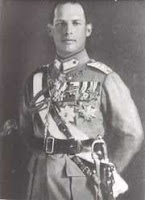Sunday Deposed Monarch Blogging: House of Schleswig-Holstein-Sonderburg-Glucksburg

In 1832 the long struggle for Greek independence ended as the Great Powers recognized the separation of Greece from the Ottoman Empire. The London Conference of 1832 made Greece a monarchy, and established as its ruler Otto I, a Bavarian prince. Although he adopted a Greek name (Othon), Otto refused to convert from Roman Catholicism to Greek Orthodoxy, and proved unable to produce an heir. He grew increasingly unpopular with the Greek people, and was forced to abdicate in 1862, at the age of 47. After searching for a replacement, the great powers settled on the equally appropriate George I, a Danish prince of the House of Schleswig-Holstein-Sonderburg-Glucksburg. In spite of his heritage, George I proved a far more capable monarch than his predecessor. First, he learned Greek, and dismissed many of his Danish advisors. Second, he helped sponsor the democratic constitution of 1864. After a successful and largely happy reign of fifty years, George I was shot on the streets of Salonika by a vagrant, alcoholic anarchist.
George II, grandson of George I, ascended to the throne in 1923, following the abdication of his father. An attempted royalist coup in the same year forced George II to flee to Romania, and he was officially deposed in 1924. Greek politics took a disastrous turn in the ensuing years, as no government could remain in power for very long, and a plebiscite returned him to the throne in 1935. Unfortunately, George II acceded to the establishment of dictatorship in 1936. The Greek government’s pro-Axis sympathies didn’t save Greece from Mussolini, who attacked and invaded Greece in October 1940. The Italian invasion fared poorly, as the Greeks launched a counter-offensive that took a large portion of Albania. In April 1941 Germany intervened, and quickly began to roll up the country. George II (who had always had pro-British sympathies) fled to Crete, then to Egypt, then to Great Britain. Before and after liberation, the question of the return of the King became politically incendiary. Many opposed his return because of his perceived sympathies with the pre-war dictatorial regime. However, in the first post-war elections monarchist parties did well, and another plebiscite returned George II in September 1946. His return helped fuel the Greek Civil War, but, as George II died in 1947, he didn’t live to see most of the bloodshed.
throne in 1935. Unfortunately, George II acceded to the establishment of dictatorship in 1936. The Greek government’s pro-Axis sympathies didn’t save Greece from Mussolini, who attacked and invaded Greece in October 1940. The Italian invasion fared poorly, as the Greeks launched a counter-offensive that took a large portion of Albania. In April 1941 Germany intervened, and quickly began to roll up the country. George II (who had always had pro-British sympathies) fled to Crete, then to Egypt, then to Great Britain. Before and after liberation, the question of the return of the King became politically incendiary. Many opposed his return because of his perceived sympathies with the pre-war dictatorial regime. However, in the first post-war elections monarchist parties did well, and another plebiscite returned George II in September 1946. His return helped fuel the Greek Civil War, but, as George II died in 1947, he didn’t live to see most of the bloodshed.
Constantine II, nephew of George II, became King in March 1964. In 1960 Constantine had  participated in Sailing events of the Rome Olympics, winning a gold medal. Constantine II soon became embroiled in a dispute with Prime Minister Papandreou that led to a series of turnovers of government. The dispute was ended by the 1967 coup of a group of right wing colonels. Although initially reluctant, Constantine II eventually agreed to collaborate on the condition that some civilian ministers would be added to the government. At the encouragement of the United States, the King attempted to launch a counter-coup in December 1967. However, due to the ineptitude of the King, this coup failed and Constantine fled. The leaders of the coup conducted yet another plebiscite in 1973 that abolished the monarchy, although the vote was believed to have been rigged. A final plebiscite in 1974, after the return of democratic governmance, confirmed the abolishment of the monarchy.
participated in Sailing events of the Rome Olympics, winning a gold medal. Constantine II soon became embroiled in a dispute with Prime Minister Papandreou that led to a series of turnovers of government. The dispute was ended by the 1967 coup of a group of right wing colonels. Although initially reluctant, Constantine II eventually agreed to collaborate on the condition that some civilian ministers would be added to the government. At the encouragement of the United States, the King attempted to launch a counter-coup in December 1967. However, due to the ineptitude of the King, this coup failed and Constantine fled. The leaders of the coup conducted yet another plebiscite in 1973 that abolished the monarchy, although the vote was believed to have been rigged. A final plebiscite in 1974, after the return of democratic governmance, confirmed the abolishment of the monarchy.
Constantine has recognized the abolition of the throne, but still refers to himself as King. Some monarchical sentiment remains in Greece, but prospects for regaining the throne seem grim. Constantine’s occasional visits to Greece have proved controversial, and he currently lives in London.
Trivia: The last reigning King and Crown Prince of what country died in a Communist internment camp?


